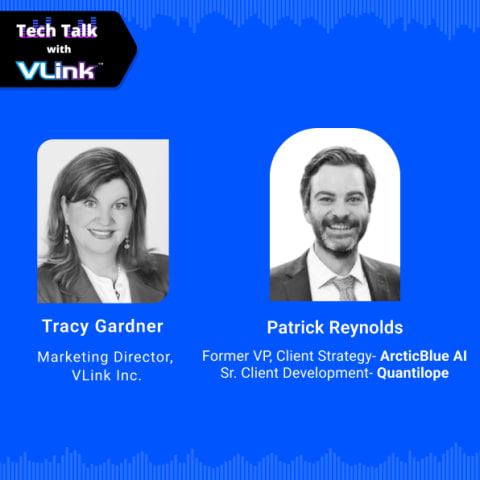The Dubai city is rapidly becoming a hub of artificial innovation in the Middle East. The main driver of the city in terms of AI-enabled solutions has been governmental initiatives, like the UAE AI Strategy 2031, and the inflow of technology-savvy startups, which made the city the center of AI-based solutions in the most important fields, including fintech, healthcare, logistics, real estate, and retail.
It is a win-win situation since companies are using AI to achieve a competitive advantage through intelligent chatbots and predictive analytics tools, autonomous systems, and personalized customer experiences.
Nevertheless, there are relevant questions that have not been answered by any party including startups, businesses, and investors as well: the cost of AI Software development in Dubai, UAE?
The cost of development of an AI software varies in Dubai and ranges between AED 275,000 and AED 1,100,000 (approximately $75,000 and $300,000). It is a matter of complexity, use case and implementation strategy.
In this case, we will decipher the main parameters that affect this cost, such as the type of project, technology stack, the size of the team and the various other hidden costs of operation. This will provide transparency to all those who are intending to develop scalable and intelligent solutions within the region.
Key Market Figures and Stats Related to Custom AI Software Development Market in Dubai
AI in Dubai is expanding at a pace, and the following key figures detail the insights regarding the degree of scale, growth, and adoption patterns that are performing in the AI software development market.
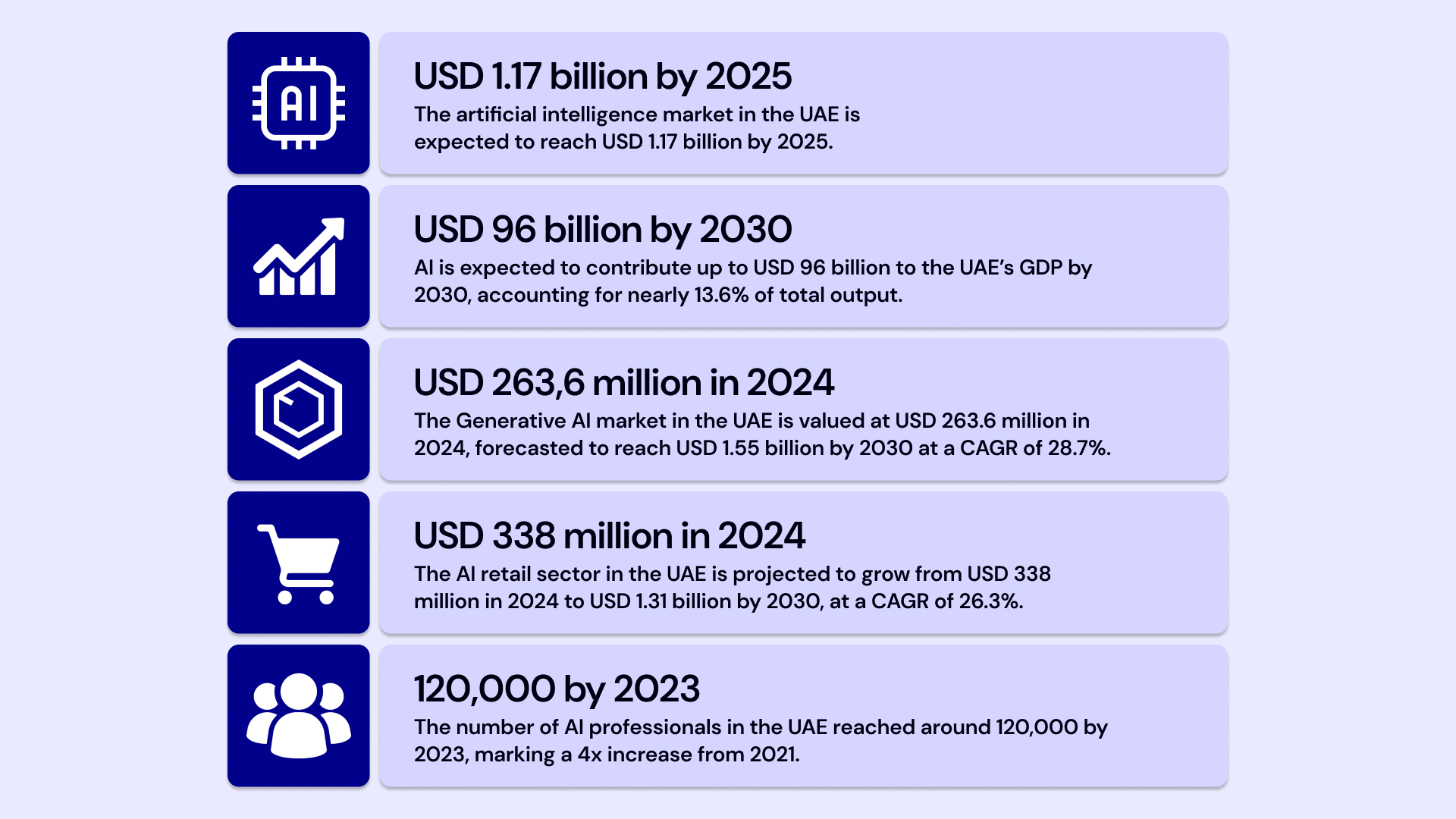
A Comprehensive Overview of Custom AI Software Development Costs in Dubai
Software development of artificial intelligence in Dubai, UAE generally fits in between AED 275,000 and AED 1,100,000+ (approximately 75,000 to 300,000+), according to the scope, functionality & complexity of the solution. Such a wide scope indicates the large variance in the scopes of use-cases, the degree of AI sophistication (traditional ML algorithms vs. generative AI), and the degree of solution customization (build vs. buy).
Regardless of whether you use data to build a smart chatbot, a predictive analytics platform, or an end-to-end enterprise AI solution, pricing depends on a number of factors, such as the data approach, the scale of the model training, deployment basis, and compliance procedures in the UAE.
In the next paragraph, we will segregate the cost of AI software development Dubai by complexity of the project and phases of development, which would help you know what to expect of your AI solution.
Stage-Wise AI Software Development Cost Breakdown
Every step of the AI development process, including discovery and data preparation, deployment, and optimization after the launch, is of great importance as it determines the Artificial Intelligence software development cost in Dubai, UAE. The total breakdown of costs in various stages of AI software development is provided below, which will also allow you to plan the main expenses you will have to make.
1. Requirement Analysis & Discovery
During this stage, business analysts and AI consultants collaborate to clarify the issue, set up some objectives, evaluate the viability, and establish the project requirements. This is a phase that determines character in regard to model selection and data strategy. It is comparably less expensive, but it is one of the core processes of matching the solution to business goals, and it also has a direct impact on the total cost of developing AI applications.
2. Data Collection & Preprocessing
Clean, high-quality data is the backbone of artificial intelligence in business. This stage involves sourcing, cleansing, labeling, and formatting data. Whether you're using existing datasets or creating new ones, the complexity and volume of data play a major role in shaping the overall AI software development cost Dubai.
3. Model Selection & Development
Here, data scientists experiment with various ML or deep learning algorithms, train models, and tune parameters for optimal accuracy. More advanced models like LLMs or neural networks require greater computational resources and expertise, which increases both time and the overall cost of AI implementation in business.
4. App or System Integration
The trained model is integrated into web, mobile, or enterprise systems. This may involve connecting with APIs, automating workflows, and ensuring seamless front-end/backend communication. This contributes to the overall cost of building AI applications.
5. Testing & Validation
The solution is rigorously tested for precision, bias, scalability, and performance across different datasets. Both manual and automated methods are used to ensure the model delivers consistent and reliable outputs. This is an essential step that directly affects the overall AI software development cost Dubai.
6. Deployment
AI within business is implemented on platforms of cloud services such as AWS, Azure or in-house servers. This is because this phase entails customization of environments, deployment of monitoring solutions, and the readiness of the system to be used in production, which adds to the total cost of software development of Artificial Intelligence in Dubai, UAE.
7. Ongoing Maintenance & Optimization
Artificial intelligence in business models need regular maintence and support, retraining, monitoring, and tuning to adapt to new data. This stage includes fixing bugs, improving performance, and ensuring the model evolves with changing user behavior or market conditions. All these factors add to the ongoing AI software development cost Dubai.
Development Stage | Estimated Cost (AED) |
| Requirement Analysis & Discovery | 25,000 – 60,000 (USD 6,800 – 16,500) |
| Data Collection & Preprocessing | 50,000 – 125,000 (USD 13,500 – 34,000) |
| Model Selection & Development | 100,000 – 300,000 (USD 27,000 – 82,000) |
| App/System Integration | 75,000 – 200,000 (USD 20,500 – 54,500) |
| Testing & Validation | 30,000 – 90,000 (USD 8,200 – 24,500) |
| Deployment | 20,000 – 75,000 (USD 5,500 – 20,500) |
| Maintenance & Optimization | 50,000 – 150,000/year (USD 13,500 – 41,000/year) |
AI Development Cost by Project Complexity
Complexity in AI project is an element that takes a considerable period and budget. Rule-based bots rely on less resources, whereas enterprise-level solutions with real-time data flows, predictive modeling, or integrations with Internet of Things or a cloud system all require engineering. This escalates the total AI software development cost Dubai.
Complexity Level | Description | Estimated Cost (AED) |
| Basic | Simple rule-based chatbots or logic-driven tools with minimal ML processing. | 100,000 – 250,000 (USD 27,000 – 68,000) |
| Moderate | AI solutions provider Dubai with supervised learning, limited datasets, and specific outcomes. | 250,000 – 600,000 (USD 68,000 – 165,000) |
| Complex / Enterprise | Full-scale AI platforms with real-time ML, big data, custom APIs & automation. | 600,000 – 1,100,000+ (USD 165,000 – 300,000+) |
AI Development Cost by Type of AI Solution
AI software development cost Dubai also varies based on the use case, target industry, and functionality of the AI system. Some solutions require extensive datasets, ongoing learning models, or high-end security, all of which increase complexity and contribute to the overall Artificial Intelligence software development cost in Dubai, UAE.
AI Type | Example Use Case | Estimated Cost (AED) |
| Chatbots & Virtual Assistants | Customer service automation in banks, ecommerce, etc. | 100,000 – 300,000 (USD 27,000 – 82,000) |
| Predictive Analytics Tools | Sales forecasting, churn prediction, demand planning | 150,000 – 400,000 (USD 41,000 – 110,000) |
| Image/Facial Recognition | Airport security, smart access control, surveillance | 250,000 – 600,000 (USD 68,000 – 165,000) |
| AI in Fintech | Fraud detection, risk assessment, and credit scoring | 300,000 – 750,000 (USD 82,000 – 205,000) |
| Healthcare AI software development cost Dubai | Diagnostic tools, medical imaging, and patient monitoring | 400,000 – 1,000,000 (USD 110,000 – 273,000) |
| AI in Retail | Product recommendations, demand forecasting | 200,000 – 550,000 (USD 55,000 – 150,000) |
Formula to Calculate AI Development Cost in Dubai
While artificial intelligence in business projects vary in scope and complexity, a general formula can help estimate the development cost:
Basic Formula:
Estimated Cost of Building AI Applications = Total Development Hours × Hourly Rate
Example Calculation:
Let’s say you're building a moderately complex AI-powered customer support chatbot. The estimated time to develop and deploy it is around 900 hours, and you’re working with a mid-level team in Dubai, charging AED 300/hour.
AI Project Cost Estimation = 900 × 300 = AED 270,000
Key Notes:
- Higher complexity = more hours (model training, data processing, testing, integration)
- Team size impacts the timeline, but not always the cost
- Include buffer for project management, QA, and iterations (typically 10–15% of total)
This formula is ideal for getting initial budget clarity before moving into more detailed planning or proposals related to AI software development cost Dubai.
Key Factors That Influence AI Software Development Cost in UAE
Artificial Intelligence software development cost in Dubai, UAE vary significantly based on the scope, technology, team, and compliance requirements. Below is a breakdown of each contributing factor with detailed explanations and cost implications.
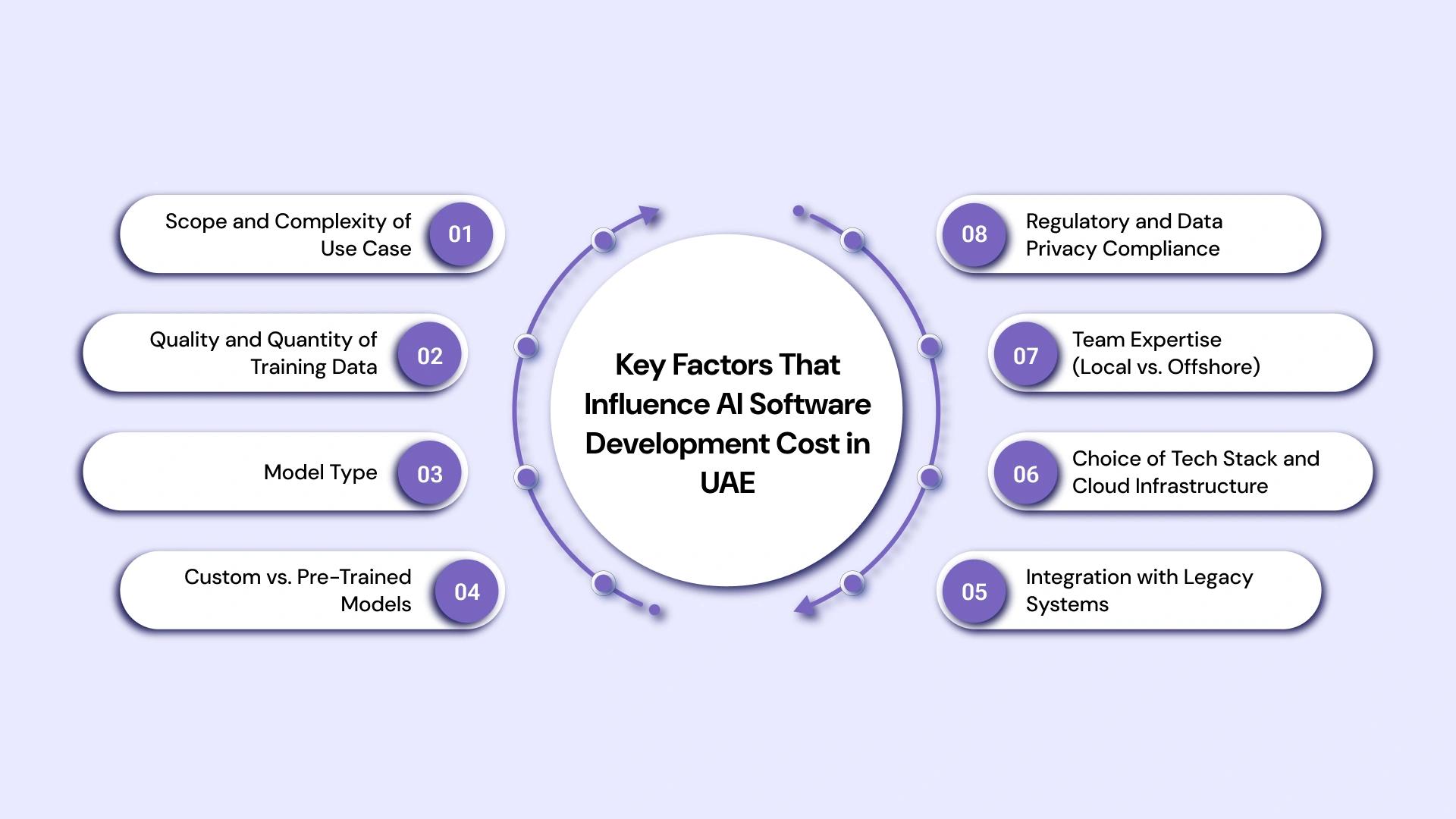
1. Scope and Complexity of Use Case
The broader and more complex the AI solution, the higher the Artificial Intelligence software development cost in Dubai, UAE For example, building a chatbot for FAQs is vastly different from building a multi-layered AI-based fraud detection system or a predictive analytics platform for healthcare.
Use Case Type | Example | Estimated Range (AED) |
| Simple chatbot (NLP) | FAQ bot for the website | 40,000 – 90,000 |
| Predictive analytics tool | Forecasting retail demand | 120,000 – 220,000 |
| Advanced computer vision app | Facial recognition in security systems | 200,000 – 400,000+ |
2. Quality and Quantity of Training Data
AI models require large volumes of labeled, high-quality data to function accurately. Data collection, cleansing, and annotation are often under-recognized cost drivers. These tasks can significantly impact the AI development cost for startups in UAE, especially given the need to comply with strict data privacy laws.
Data Quality & Source | Description | Cost Impact |
| Public/open datasets | Freely available but generic | Low |
| In-house proprietary data | Unique but requires cleaning and validation | Medium to High |
| Third-party licensed data | Industry-specific and pre-labeled | High |
3. Model Type (ML, DL, NLP, CV, etc.)
Different types of AI models impact AI project cost estimation based on their complexity, data needs, and compute requirements. Machine learning development services is best for structured data tasks like predictions and classifications. Deep learning (DL) and computer vision (CV) require more resources due to GPU-intensive training and unstructured data. NLP models vary in cost depending on language support and whether pre-trained models are fine-tuned or built from scratch.
Model Type | Use Case Example | Cost Level |
| Machine Learning | Churn prediction, scoring | Medium |
| Deep Learning | Image classification | High (GPU usage) |
| Natural Language Processing (NLP) | Sentiment analysis, chatbots | Medium to High |
| Computer Vision | Object detection, AR filters | High |
4. Custom vs. Pre-Trained Models
Using pre-trained models (like OpenAI, Google Cloud Vision, or Hugging Face transformers) can significantly reduce development time and expenses. In contrast, fully custom models require extensive R&D and specialized training, which increases the AI development cost for startups in UAE.
Model Type | Time to Market | Accuracy Potential | Cost Range (AED) |
| Pre-trained | Fast | Moderate | 30,000 – 120,000 |
| Fine-tuned | Medium | High | 80,000 – 250,000 |
| Custom-built | Slowest | Highest | 200,000 – 500,000+ |
5. Integration with Legacy Systems
Integrating the AI solution with existing CRMs, ERPs, analytics systems, or internal APIs adds complexity. Each system requires different authentication, data formatting, and testing efforts. This makes integration one of the key factors affecting AI software cost in Dubai.
Integration Type | Description | Cost Impact |
| No integration | Standalone AI product | Low |
| API-based integrations | Connects to existing platforms | Medium |
| Complex system sync | Requires ETL pipelines, middleware | High |
6. Choice of Tech Stack and Cloud Infrastructure
AI solutions built on cloud platforms like AWS SageMaker, Azure ML, or GCP incur recurring costs for GPU/TPU compute, storage, and inference processing. These services offer scalability but increase expenses as model complexity and data volume grow. Cloud usage is often billed monthly based on resource consumption and deployment scale.
Stack/Infra Type | Use Case Type | Monthly Cloud Cost (AED) |
| Open-source + local | Internal ML tools | 3,000 – 10,000 |
| Cloud-managed (AWS/GCP/Azure) | High-scale AI systems | 12,000 – 45,000+ |
| Hybrid (on-prem + cloud) | Data-sensitive sectors | 20,000 – 70,000+ |
7. Team Expertise (Local vs. Offshore)
Hiring a Dubai-based AI team ensures better compliance and alignment with local market needs, but it comes at a higher AI project cost estimation. Offshore software development or hybrid teams may reduce the AI software development cost Dubai, but require strong project management and clear communication to maintain quality and timelines.
Team Type | Hourly Rate (AED) | Benefits | Risks |
| Local UAE Team | 250 – 450 | Regional knowledge, fast comms | Higher cost |
| Offshore Team | 120 – 250 | Cost-effective | Time zones, cultural mismatch |
| Hybrid Model | 180 – 350 | Balanced delivery + support | Needs careful coordination |
8. Regulatory and Data Privacy Compliance
Legal compliance is a significant consideration when developing AI solutions in the UAE. Adhering to regulations such as PDPL, DHA, and GDPR introduces additional requirements like encryption, audit trails, and legal consultations. These compliance demands are among the key factors affecting AI software cost in Dubai.
| Compliance Type | Industry Example | Added Cost Estimate (AED) |
| Basic compliance | Retail apps with sign-in | 5,000 – 10,000 |
| Financial sector | KYC, AML, data retention | 20,000 – 50,000 |
| Healthcare | Patient data, PDPL, DHA | 30,000 – 100,000+ |
Cost Comparison: In-House vs. Outsourced AI Development in UAE
Choosing between building an internal AI team and outsourcing development is a major decision that directly affects cost, speed, and long-term scalability. While in-house teams provide more control and domain continuity, they come with higher fixed costs and longer setup times. Outsourcing, on the other hand, offers faster execution and access to global expertise, though it may require more rigorous project management to align deliverables.
In the UAE, many startups and enterprises prefer outsourcing AI development to experienced vendors—either locally or in nearshore/offshore markets—to reduce overhead and better manage the Artificial Intelligence software development cost in Dubai, UAE. However, enterprises focused on long-term AI innovation or developing proprietary models may choose to build internal teams for strategic control.
Criteria | In-House Team | Outsourced Development |
| Initial Setup Time | 2–4 months (recruitment, onboarding, infrastructure) | 2–4 weeks (engagement kickoff) |
| Average Monthly Cost | AED 100,000 – AED 250,000+ (team salaries + benefits) | AED 40,000 – AED 120,000 (based on project scope) |
| Expertise Access | Limited to internal hires | Wide access to niche experts (AI/ML/NLP/CV) |
| Scalability | Slower—requires hiring and training | Faster—can scale team size on demand |
| Long-Term Control | Full control over codebase, data, and strategy | Shared control; ownership must be defined contractually |
| Flexibility | Lower—fixed team structure | Higher—can adapt to project needs and switch models |
| Maintenance & Support | Fully internalized | Usually included as part of engagement or add-on |
| Best Suited For | Large enterprises with long-term AI goals | Startups, SMEs, short-term or one-off projects |
Hidden AI Software Development Costs in Dubai
Beyond upfront development, AI projects often carry hidden expenses that can significantly impact the total cost. These overlooked elements are frequently underestimated during the initial planning stage, yet they play a crucial role in long-term success, compliance, and the true AI software development cost Dubai.
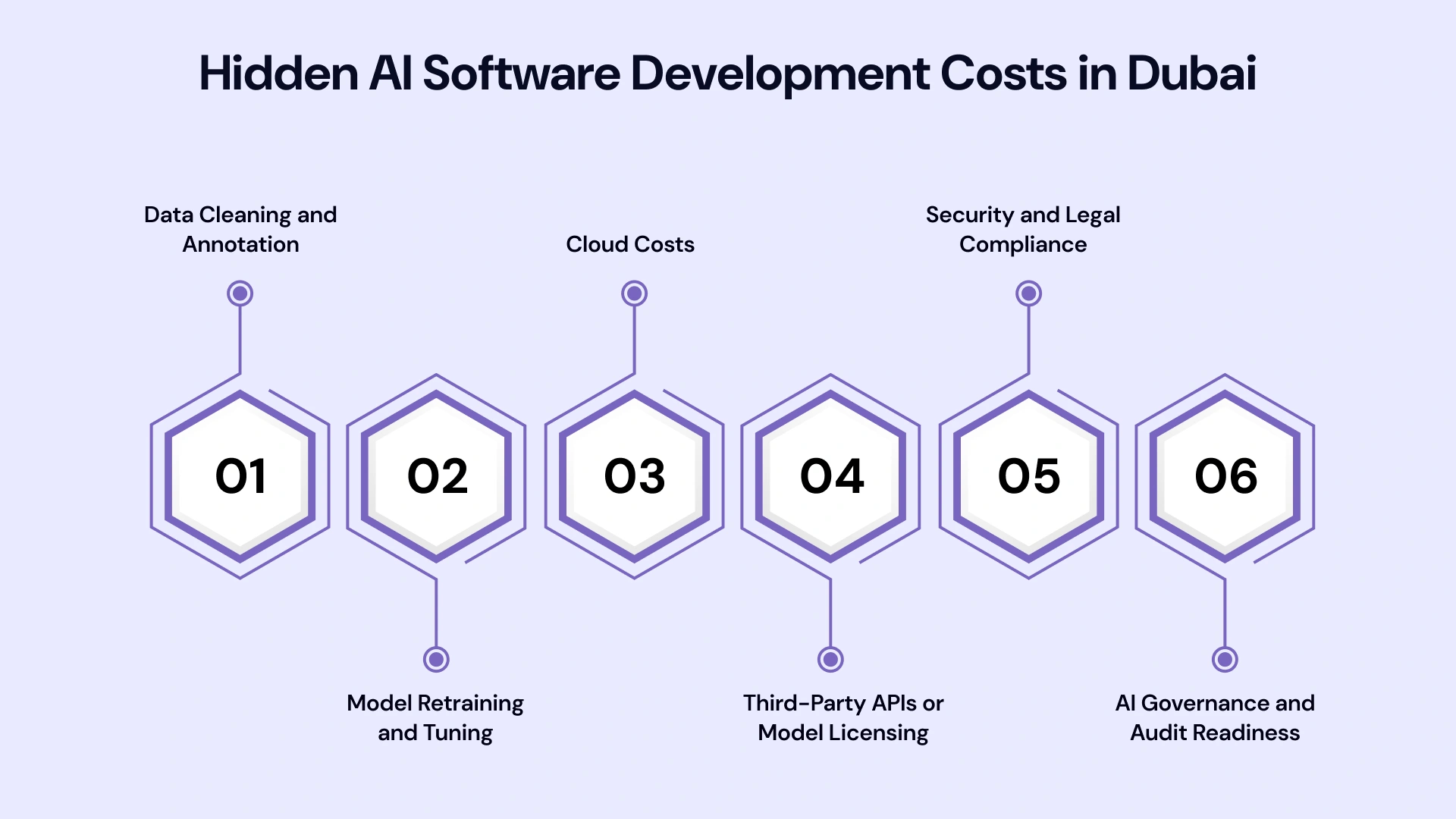
1. Data Cleaning and Annotation
Raw data is rarely usable in its original form. Before training, datasets must be cleaned, standardized, and annotated—especially for NLP, CV, and deep learning applications. Manual data labeling (e.g., bounding boxes for images or intent tagging for text) can take weeks and often requires domain experts.
- Impact: Increases time and labor costs
- Typical cost range: AED 10,000 – AED 100,000, depending on volume and complexity
2. Model Retraining and Tuning
AI models degrade over time as data patterns shift. Periodic retraining and hyperparameter tuning are required to maintain performance, especially for real-time or high-volume systems. This includes collecting new data, retraining the model, and redeploying it.
- Impact: Recurring technical cost
- Typical cost range: AED 15,000 – AED 80,000 per retraining cycle
3. Cloud Costs (GPU Instances, Storage)
Running AI models in production environments requires significant compute power. GPU instances, TPU access, cloud storage, and inference serving all contribute to ongoing cloud bills, particularly for apps using deep learning or real-time processing.
- Impact: Monthly operational expense
- Typical cost range: AED 3,000 – AED 45,000/month based on usage
4. Third-Party APIs or Model Licensing
Using third-party APIs like OpenAI, Google Vision, or Azure Cognitive Services, or licensing pre-built models, often involves usage-based billing or annual fees. While these options reduce development time, they introduce recurring costs that can significantly increase the overall AI software development cost Dubai as user traffic grows.
- Impact: Variable operational cost
- Typical cost range: AED 500 – AED 20,000/month
5. Security and Legal Compliance (PDPL, GDPR)
In the UAE, apps using AI must follow PDPL and, in many cases, GDPR. Ensuring compliance involves encryption, audit logging, data residency enforcement, and periodic legal reviews, especially for sectors like healthcare or fintech.
- Impact: Legal and infrastructure costs
- Typical cost range: AED 10,000 – AED 50,000/year
6. AI Governance and Audit Readiness
Enterprise-grade AI systems require explainability, version control, audit trails, and bias monitoring. Building such governance frameworks (especially for regulated sectors) adds additional development and operational complexity.
- Impact: Strategic compliance cost
- Typical cost range: AED 20,000 – AED 100,000+, depending on maturity level
Cost Component | Type | Typical Cost (AED) | Billing Cycle |
| Data cleaning & annotation | Pre-development | 10,000 – 100,000 | One-time or per dataset |
| Model retraining & tuning | Post-deployment | 15,000 – 80,000 | Per cycle |
| Cloud compute & storage | Infrastructure | 3,000 – 45,000/month | Monthly |
| API/model licensing | External dependency | 500 – 20,000/month | Monthly |
| Security & legal compliance | Compliance | 10,000 – 50,000/year | Annual |
| AI governance readiness | Audit/strategy | 20,000 – 100,000+ | One-time/periodic |
How to Reduce Your Artificial Intelligence Software Development Cost in Dubai, UAE
AI development services in Dubai can be expensive, but careful planning and smart choices can significantly reduce costs without sacrificing performance. Below are proven strategies that help businesses in the UAE optimize their AI development budgets.
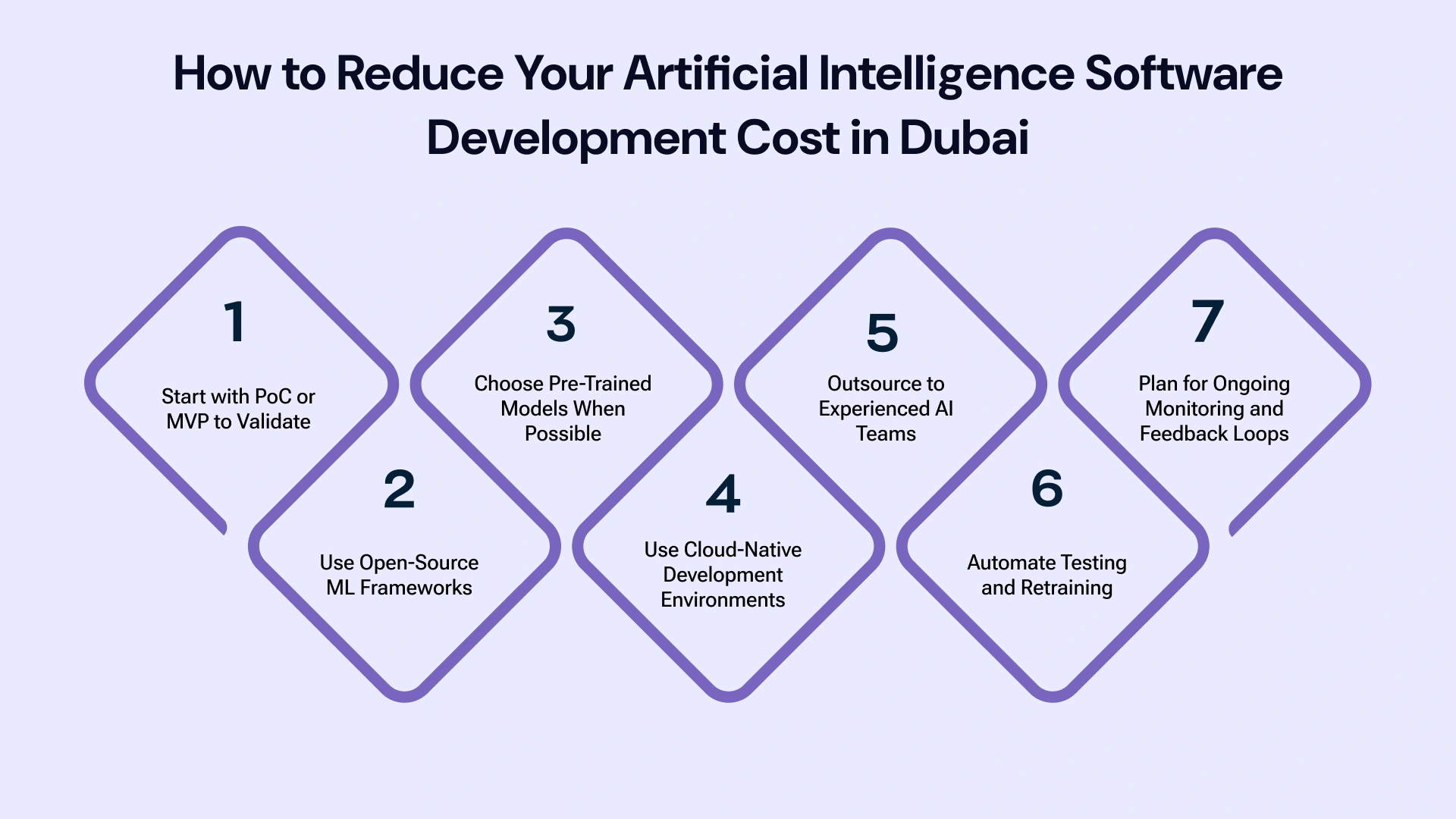
1. Start with PoC or MVP to Validate
Building a full-scale AI system without testing assumptions leads to wasted resources. A Proof of Concept (PoC) or Minimum Viable Product (MVP) helps validate technical feasibility and user demand before investing in advanced features or infrastructure. The MVP cost for AI startup projects in Dubai is often significantly lower than full-scale development. This approach is especially useful for new product concepts or high-risk AI initiatives.
- Why it works: Saves time and budget by identifying failures early
- Ideal for: New product ideas or high-risk AI projects
- Cost savings: Up to 30% on initial development
2. Use Open-Source ML Frameworks
Popular frameworks like TensorFlow, PyTorch, Scikit-learn, and Hugging Face offer powerful capabilities without licensing fees. These tools are widely supported and can drastically cut development time when used properly.
- Why it works: Avoids proprietary software fees
- Ideal for: Most AI applications in NLP, CV, and ML
- Cost savings: 10–20% of development costs
3. Choose Pre-Trained Models When Possible
Rather than training models from scratch, businesses can fine-tune pre-trained models like BERT, GPT, YOLO, or ResNet. These models are already optimized and reduce compute time, training data needs, and infrastructure costs.
- Why it works: Cuts down training time and lowers GPU usage
- Ideal for: NLP, vision, and speech-based projects
- Cost savings: 25–40% in computing and labor costs
4. Use Cloud-Native Development Environments
Platforms like AWS SageMaker, Azure Machine Learning, and Google Vertex AI provide end-to-end environments for developing, testing, deploying, and scaling AI applications. They eliminate the need for managing physical infrastructure or setting up environments manually.
- Why it works: Offers pay-as-you-go scalability and faster setup
- Ideal for: Startups and enterprises looking to scale
- Cost savings: Reduces DevOps and setup overhead by 20–30%
5. Outsource to Experienced AI Teams
Hiring a local or offshore mobile app development company in Dubai with a proven track record allows you to avoid costs related to recruiting, training, and managing an in-house team. These teams bring domain knowledge, reusable components, and established workflows.
- Why it works: Minimizes hiring delays and overheads
- Ideal for: Projects with limited internal tech resources
- Cost savings: 25–60% compared to building a full internal team
6. Automate Testing and Retraining
Manual QA and model retraining are time-consuming and error-prone. Automated tools for testing, monitoring, and retraining ensure models remain accurate and efficient while reducing manual labor.
- Why it works: Lowers long-term QA and support costs
- Ideal for: Scalable or data-sensitive applications
- Cost savings: 15–25% in maintenance and quality assurance
7. Plan for Ongoing Monitoring and Feedback Loops
Instead of reacting to failures post-launch, it’s important to plan for continuous model monitoring, user feedback collection, and incremental updates. This proactive approach is commonly recommended by providers of AI development services in Dubai, as it helps avoid major technical debt and reduces the cost of future overhauls.
- Why it works: Enables proactive cost control and better user satisfaction
- Ideal for: Any AI system in active use
- Cost savings: Prevents rework and reduces support costs long term
How to Earn Revenue From Your AI-Powered Software
The success of an AI-powered product doesn't end at development. A well-planned monetization strategy ensures the solution generates sustainable revenue and scales with market demand. Many providers offering AI development services in Dubai also guide businesses on choosing the right revenue model to maximize long-term returns.
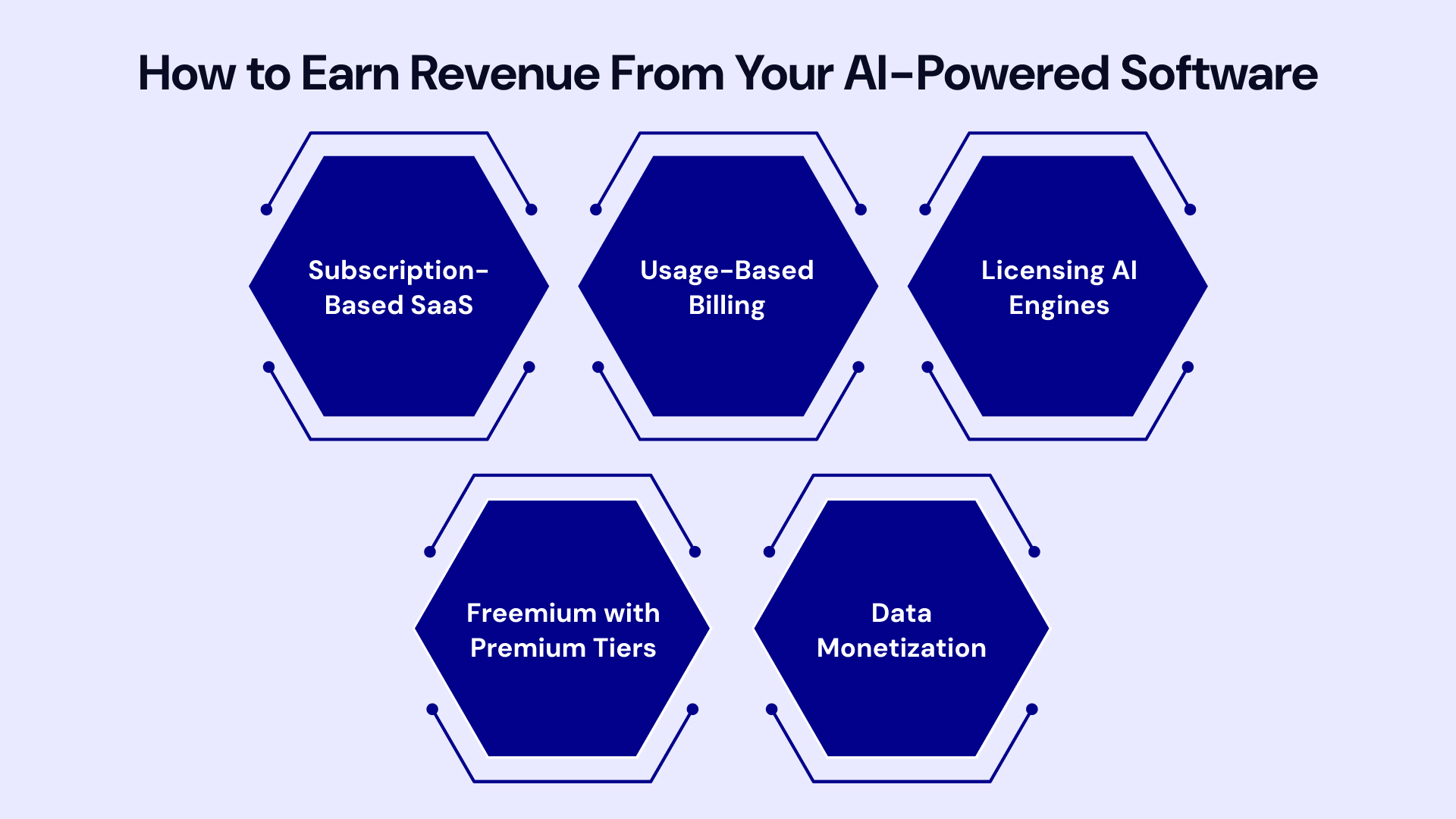
1. Subscription-Based SaaS
In this model, users pay a recurring monthly or annual fee to access the AI software. It is particularly effective for enterprise-focused applications such as AI-driven analytics dashboards, intelligent workflow automation tools, or industry-specific CRM systems. Subscription tiers are usually structured based on feature availability, data volume, or user count. This approach offers predictable cash flow and high customer lifetime value, making it one of the most common models for B2B AI solutions.
2. Usage-Based Billing (API Calls, Credits)
This model charges users based on how much they interact with the AI system. For instance, the number of API calls, the number of files processed, or the total minutes of audio transcribed. AI service providers in areas like computer vision, NLP, or speech processing frequently adopt this model. It offers a flexible and scalable pricing approach, especially for developer tools or backend AI services where usage can vary significantly between customers.
3. Licensing AI Engines
Companies that build high-performing proprietary AI engines often license them to other organizations, allowing integration into internal systems or third-party products. This model is commonly used in sectors like healthcare, finance, or logistics, where custom-built AI capabilities, such as fraud detection algorithms or demand forecasting engines, offer a significant competitive advantage. Licensing typically involves a flat annual fee or usage-based terms, depending on the nature of the agreement.
4. Freemium with Premium Tiers
The freemium model offers a limited set of features at no cost while reserving advanced capabilities, such as priority processing, large-scale data handling, or deep analytics, for paying users. This strategy is widely used in AI-powered SaaS tools aimed at small businesses or individual users. It helps in acquiring a broad user base early on and converting the most engaged users into paying customers through clear value differentiation between free and premium tiers.
5. Data Monetization (for Analytics-Based Products)
Some AI applications generate insights from user data that can be anonymized and packaged for external reporting, benchmarking, or industry analysis. In such cases, revenue is derived from selling aggregate insights to third parties or using that data to enhance internal product offerings. This model is particularly relevant for platforms operating in sectors like retail, logistics, or healthcare, where data-driven insights have commercial value. Strict adherence to the UAE’s data protection laws, such as PDPL, and global standards like GDPR, is mandatory when applying this model.
Why Choose VLink for AI Software Development in Dubai?
VLink is a trusted AI development company with over 18 years of experience delivering high-impact digital solutions, including intelligent software powered by machine learning, computer vision, and NLP. With a strong local presence in Dubai, we help organizations build AI applications that are scalable, secure, and aligned with UAE compliance standards.
Our AI experts have enabled businesses to reduce development costs by up to 30% through smart architecture choices, pre-trained model integration, and modular deployment strategies. We’ve also helped clients accelerate their time-to-market by 40% by using reusable components and agile delivery models.
Whether you're planning a predictive analytics platform, a chatbot, or an enterprise-grade AI product, our team ensures each solution is technically robust and future-ready. From dedicated AI developers to full-cycle outsourced delivery, our flexible engagement models support both startups and large enterprises.
We also bring a strong understanding of UAE data laws, including PDPL compliance, ensuring your AI product meets both legal and operational expectations from day one.
Want to understand what your AI project could cost? Schedule a free consultation with our Dubai-based experts and get an accurate estimate for your Artificial Intelligence software development cost in Dubai, UAE.





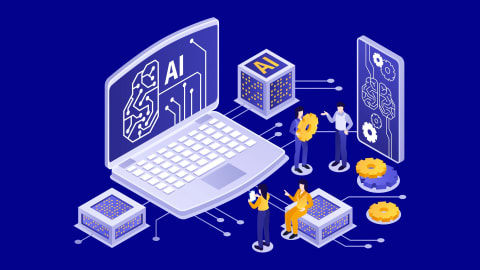



 Shivisha Patel
Shivisha Patel





